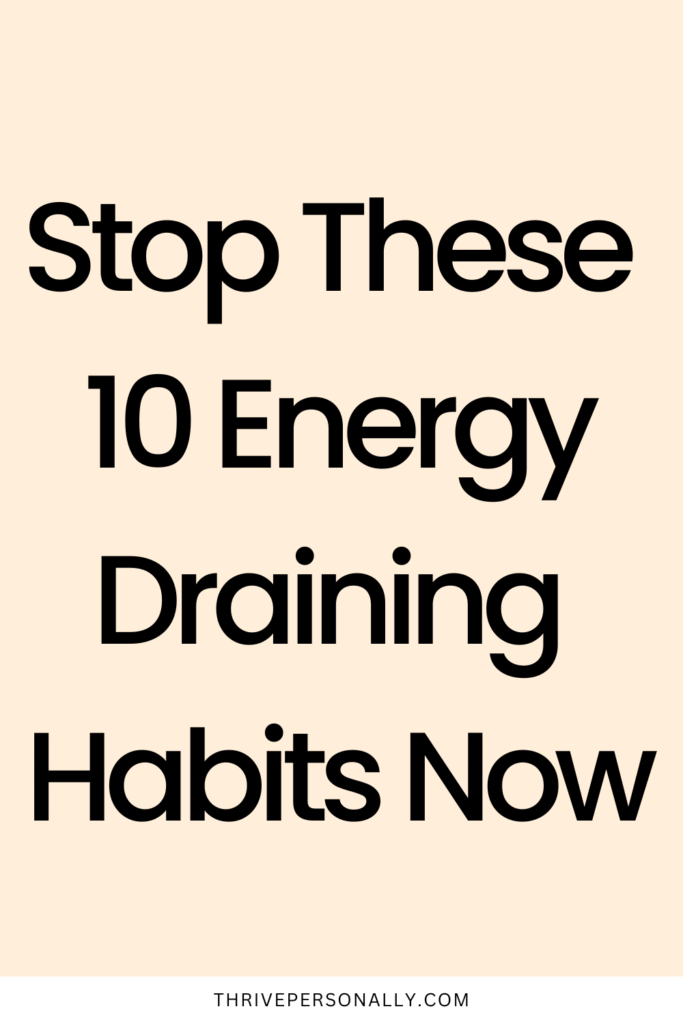Gradually, I came to the conclusion that my tiredness was not just a random occurrence. There were too many small drains on my energy—little habits and situations that life disguised so well. Each one alone didn’t seem dangerous, but together they stole my concentration, my composure, and my strength.
I realized something important: energy is not only about the food you eat or the hours you sleep. It is also shaped by what you allow into your mind and how you treat your body every day.
You may be doing these things without even noticing. Some energy drains are so familiar that they feel normal. Yet they quietly harm you. If you’ve been feeling chronically tired, unmotivated, or overwhelmed, the cause may be much closer than you think.
Below are ten hidden energy-depleting habits you might be doing—and why letting them go will help you reclaim your strength.
1. Saying “Yes” When You Want to Say “No”
The discomfort of turning someone down is a feeling you probably know well. It can seem easier to say “yes” than to refuse. But every time you agree to something you don’t want to do, you lose time, mental focus, and emotional space.
It’s not just the hours you give away—it’s the mental weight of carrying unwanted commitments. You start treating your own needs as less important than others’, and over time, you believe your boundaries don’t matter. That leads to bitterness and burnout.
Learning to say “no” without guilt isn’t selfish—it’s self-respect. Protecting your energy begins with honoring your limits.
Read also: 15 Reasons Why Saying No is a Life Skill You Need to Learn
2. Losing Sleep Over Overthinking
It’s tempting to believe that analyzing everything will help you make better decisions. But there’s a thin line between healthy reflection and mental overdrive. Overthinking traps you in endless “what ifs” long after the situation is over.
Your brain, like any muscle, gets tired when overused. Overthinking drains mental energy and triggers stress hormones, which cause physical fatigue. A study in the Journal of Neuroscience found that making repetitive decisions without breaks makes tasks seem harder and reduces brain efficiency.
Not every situation needs to be examined from every angle. Sometimes, the best thing for your energy is to make a choice, trust it, and move forward.
Read also: 10 Guidelines for Creating Better Sleeping Habits
3. Holding onto Grudges
A grudge might feel like something you can tuck away, but it’s actually one of the heaviest burdens you can carry. It runs in the background of your mind, draining your emotional battery. You relive the same moments again and again, keeping old pain alive.
Forgiveness doesn’t mean approving what happened—it means choosing not to be controlled by it. According to the Mayo Clinic, forgiveness can lower blood pressure, reduce anxiety, and improve heart health—all of which boost your mental clarity and energy.
Letting go isn’t weakness. It’s freeing your energy for better things.
Read also: 5 Tips on How to Truly Forgive Someone
4. Scrolling Without Thinking
You tell yourself you’ll just check your phone for a moment, but half an hour disappears. Excessive social media use is linked to stress and poor sleep (source).
Endless scrolling doesn’t just waste time—it overloads your brain with random information. Your attention jumps from one thought to another, creating constant mental motion and exhaustion. Over time, this scattered focus makes it harder to stay present in real life.
Your attention is one of your most valuable forms of energy. Guard it carefully.
Read also: How to Get Rid of Your Phone Addiction 8 Tips
5. Multi-Tasking All Day
Switching between demanding tasks feels productive, but your brain can’t truly focus on two things at once. It rapidly alternates, which burns more mental energy than doing each task separately.
At the end of the day, you may feel exhausted yet realize you’ve accomplished little. Doing one thing at a time not only saves energy but also improves the quality of your results.
6. Disrupting Your Sleep Rhythm
It’s not just how long you sleep—it’s when you sleep. Going to bed and waking up at different times confuses your body’s natural clock.
Your circadian rhythm regulates your energy, hormones, and alertness. When you constantly disrupt it, your energy levels swing unpredictably. One of the simplest ways to keep your energy steady is to maintain a consistent sleep schedule.
7. Negative Self-Talk
When your inner voice is full of criticism, judgment, and doubt, you drain your emotional energy before the day even starts.
Negative self-talk doesn’t just affect your mood—it affects your body. Long-term stress from self-criticism can weaken your immune system and leave you feeling physically drained. Replacing harsh thoughts with kinder, more encouraging ones can make you feel lighter and more motivated.
8. Not Drinking Enough Water
Dehydration is one of the most common but overlooked causes of daily fatigue. Water is essential for nearly all body functions, from transporting nutrients to keeping your brain alert.
If you often feel tired for no clear reason, you might simply need more water. Drinking steadily throughout the day will help keep your energy stable.
9. Staying Inactive for Too Long
When you’re tired, exercise may be the last thing you want to do. But staying still for long periods signals your body to conserve energy, which leaves you feeling even more sluggish.
Movement increases blood flow, delivers oxygen to your brain, and releases endorphins—your body’s natural energy boosters. You don’t need intense workouts; gentle daily activity is enough to keep your energy from sinking.
10. Living in Clutter
Your surroundings affect your mind more than you think. A messy or crowded space constantly reminds you of unfinished tasks, quietly stressing your brain.
A clear, organized space gives your mind less to process, leaving you calmer and more focused. Even small steps toward tidiness can noticeably lift your energy.
Closing Thoughts
Energy is one of your greatest resources. Without it, even the things you love can feel heavy. These habits may seem harmless individually, but together they make life harder than it needs to be.
You don’t have to change everything overnight. Dropping just one or two of these habits can free your mental and physical energy in surprising ways. And when you reclaim your energy, you’ll find that life doesn’t just feel easier—it feels richer.
Save the pin for later



